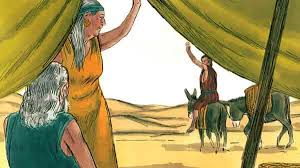Then Isaac Sent Jacob to Laban,
the Brother of Rebekah
27:46 to 28:5
Then Isaac sent Jacob to Laban, the brother of Rebekah DIG: Why didn’t Isaac want Jacob marrying a Hittite woman? What did Rebekah really want? What did she get? What does El Shaddai mean? Why is it mentioned here again (see 17:1a)? What does the absence of any trace of Isaac in the remainder of the book of Genesis imply?
REFLECT: Do you have any sense that you are like Jacob, running from your past, and fearing revenge? Have you ever been protected from harm by a family member? In what way(s) have you been blessed by your family?
Then Rebekah, once again deceiving her husband for the sake of her son, said to Isaac, “I’m disgusted with living because of these Hittite women. If Jacob takes a wife from among the women of this land (as Esau had), from Hittite women like these, my life will not be worth living” (27:46). No doubt they were a source of grief to both Isaac and Rebekah (26:34-35), but she used this situation to trick Isaac in order to allow Jacob to get a wife from her own people. In that way she could get Jacob to flee with Isaac’s blessing, and at the same time, protect him from Esau. Humanly speaking, this was a brilliant plan. She got two birds with one stone. But the problem was that she outsmarted herself. By the time Jacob returned home again she will have died. Rebekah will never see her son again. In this sense, the resulting curse did fall on her (27:13). There are two curses in life. One is that you don’t get what you want. The other is that you get what you want.
So Isaac was persuaded by Rebekah’s logic and called for Jacob (Hebrew: Ya’akov), blessed him again and commanded him not to marry a Canaanite woman. This introduces the motif of Ya’akov taking a wife from Rebekah’s relatives in Mesopotamia. Jacob was around seventy-five years old. He received the same instructions as Abraham gave to his servant almost a hundred years earlier when Isaac himself was ready to marry.449 Go at once to Paddan Aram, to the house of your mother’s father Bethuel. Take a wife for yourself there, from among the daughters of Laban, your mother’s brother (28:1-2).
Throughout the Bible we find that God does not want the godly to marry the ungodly. In Genesis 6 the result of the fallen angels, or sons of God, marrying the daughters of men resulted in the judgment of the Flood and only eight godly people left on the earth. Such intermarriage always leads to godlessness and ADONAI forbids it (Second Corinthians 6:14). If you are thinking about marrying an unbeliever, let me say this. If you cannot win him or her to Jesus before you get married, you will not win him or her to the Lord after you are married. Missionary dating does not work. You might say, “They will change,” and you are right. They will get worse after you say, “I do.”
Then, in order that neither Rebekah nor Jacob could have any more doubt that he fully desired and intended that Jacob should have the full blessing, Isaac repeated the blessing in terms much more like those which he himself had received from God (26:3-5).450 He said: May El Shaddai bless you and make you fruitful and increase your numbers until you become a community of peoples (28:3). Isaac reiterated the blessing from God Almighty (17:1a). This name comes from the idea that all might and power is expressed in the term God or El. The word Almighty comes from a root word meaning strong, powerful or to do violence, especially in the sense of one who is so powerful, He is able to set aside the laws of nature. As El Shaddai, He is able; nothing is impossible for Him. He was wholly capable of fulfilling all the promises that He had made to Abraham, Isaac and Jacob. Isaac said to his son, “May He give you and your descendants the blessing given to Abraham, so that you may take possession of the land that God gave to Abraham” (28:4).

Then Isaac sent Jacob on his way from Beersheba, and he went to Paddan Aram around the age of seventy-five to Laban, son of Bethuel the Aramean, the brother of Rebekah, who was the mother of Ya’akov and Esav (28:5). Isaac knew how El Shaddai had protected him, and he was confident that He would do the same for his son Jacob.
Except for his death (35:27-29), this is the last we hear of the life of Isaac in Genesis. It is remarkable that Isaac lived over fifty years after this and nothing is recorded of him. His life was generally much quieter than his father or his son. But it seems as though the utter silence of these fifty years was intended to remind us of the sin of Isaac after his deliberate attempt to avoid the blessing of his son Jacob.



Leave A Comment